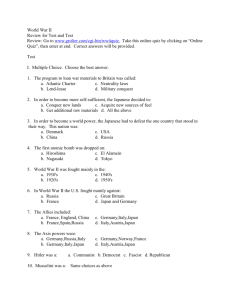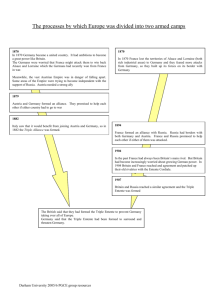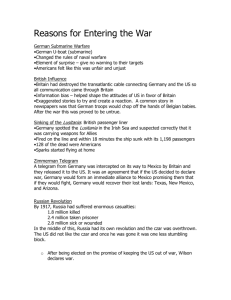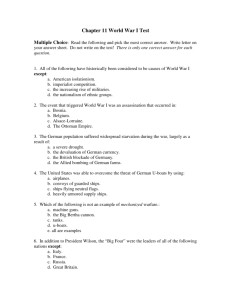Discuss the impact of Germany's foreign policy on the period in
advertisement
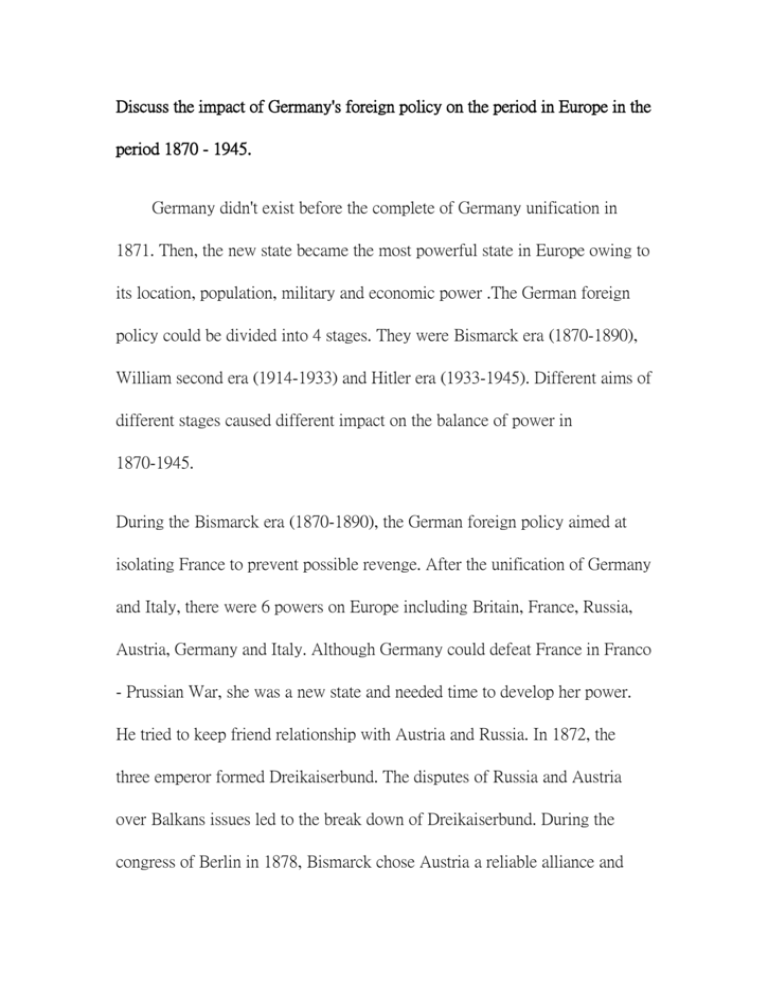
Discuss the impact of Germany's foreign policy on the period in Europe in the period 1870 - 1945. Germany didn't exist before the complete of Germany unification in 1871. Then, the new state became the most powerful state in Europe owing to its location, population, military and economic power .The German foreign policy could be divided into 4 stages. They were Bismarck era (1870-1890), William second era (1914-1933) and Hitler era (1933-1945). Different aims of different stages caused different impact on the balance of power in 1870-1945. During the Bismarck era (1870-1890), the German foreign policy aimed at isolating France to prevent possible revenge. After the unification of Germany and Italy, there were 6 powers on Europe including Britain, France, Russia, Austria, Germany and Italy. Although Germany could defeat France in Franco - Prussian War, she was a new state and needed time to develop her power. He tried to keep friend relationship with Austria and Russia. In 1872, the three emperor formed Dreikaiserbund. The disputes of Russia and Austria over Balkans issues led to the break down of Dreikaiserbund. During the congress of Berlin in 1878, Bismarck chose Austria a reliable alliance and support Austria more than Russia. Russia withdrew the alliance and Bismarck found it was impossible to coordinate the conflicts between Russia and Austria. At the end, she chose Italy to form Triple Alliance with Austria and Germany in 1882. And he also signed Reinsurance Treaty with Russia in 1887. In Bismarck era (1870-1890), the alliance system still could work well because of Bismarck's skillful diplomacy, which aimed at preserving a peaceful environment. At that time, France was isolation and was the most powerful maritime power. The balance of power was imbalance as it on the German side. During William second era (1890-1918), Germany aimed at expanding overseas. German foreign expansion showed its colonial disputes with France and Britain. The rapid rise of Germany in Europe alarmed Britain. William second didn't sign the Reinsurance Treaty with Russia and in 1894 there was Franco-Russian Alliance. In 190, Triple Entente was formed with member of Britain, France and Russia. Although Triple Entente and Triple Alliance had three powers, Triple Alliance was more danger as it's member ----- Italy was not reliable. Italy joined the Allied power in 1915 proved the agreement. The navy race between Britain and Germany over the build of destroyers and the pass of conscription law in both powers like France and Germany. And German ambition in Morocco crisis (1905-1911) led to German isolation. In 1914, on Austria became her reliable alliance. But the balance of power still can keep, as Germany was strong enough to be against the Allied power on both sides until 1918. However, the German attempts to involve Mexico in an invasion of the USA (the Zimmermann Telegram) provoked US joined the Allied sides. The balance of power was collapse and Germany become an isolated one and communist Russia also isolated. As a result, Germany was a new balance of power. During the Weimar Republic era (1918-1933), Germany aimed at Re-build German prestige and keep good relationship with other countries. In the Treaty of Versailles, Germany was forced to accept war guilty, reparation and ceded lands. In that time, the European affair was lead by Britain and France while USA introduced its isolation policy in 1919. France signed military treaties with ' Little Entente' to isolate Germany, Britain, to keep balance of power, didn't sign any new mutual assistance treaty with France. In 1919, France tried her best to keep peace and weaken Germany. Germany was the most powerful states facing the newly established states like Austria, Hungary, Poland, Baltic states and so on. Germany successfully in got US aid in Dawes Plan in 1924 to solve the reparation problem. In 1925, Germany signed the Locarno Treaty to recognize its western frontier with France and Belgium. In 1928, Germany signed Briand - Kellog Pact to denounce war as a method to solve disputes. Germany rejoin the international affair balanced the Russia was isolated as the democratic power didn't trust her. Italy was a little power but couldn't be against France face by face. Thus, the new balance of power in Europe was Germany face France at that time. In Hitler era (1933-1945), German foreign policy was expansion. The rearmament of Germany after 1933 destroys the balance of power. Hitler tried to pacify the fear of France and Britain. In 1935, he signed Anglo-German naval agreement limited German naval fleet to 35% of the British tonnage. Hitler's friendship gesture towards Britain caused France could not be against Germany solely. Eventually, Britain and France gave free hand for Hitler invaded Europe through appeasement policy. As a result, Austria, Czechoslovakia and Poland were invaded from 1938 to 1939. The signing of Pact of steel with Italy and Nazi-Soviet Non Aggression Pact with Russia gave Hitler freed hand to attach France and Britain on Western Europe. In Wartime (1939-1945), Germany dominated the whole Europe. The balance of power left Soviet Russia and Britain to be against Nazi Germany in Central Europe. France was defeated in 1940. In Hitler era, Soviet really benefit from Nazi invasion. The signing of Nazi-Soviet Non Aggression Pact led to Russian Expansion in East Europe to occupied Baltic States and Poland. After the Second World War, Soviet Russia became the super power and US also a super power. The fall of Britain, France, Germany and Italy led to Europe was dominated US and Russia in 1945. In conclusion, Germany really an important power in the period 1870-1945. Each stage Germany foreign policy had special aim and each time it change the balance of power. The hostility and friendship toward other states changed the foreign policy of other countries. The balance of power from Six Europe powers including Britain, France, Russia, Austria, Germany and Italy to two super power including US and Soviet Union was the impact of German foreign policy.


